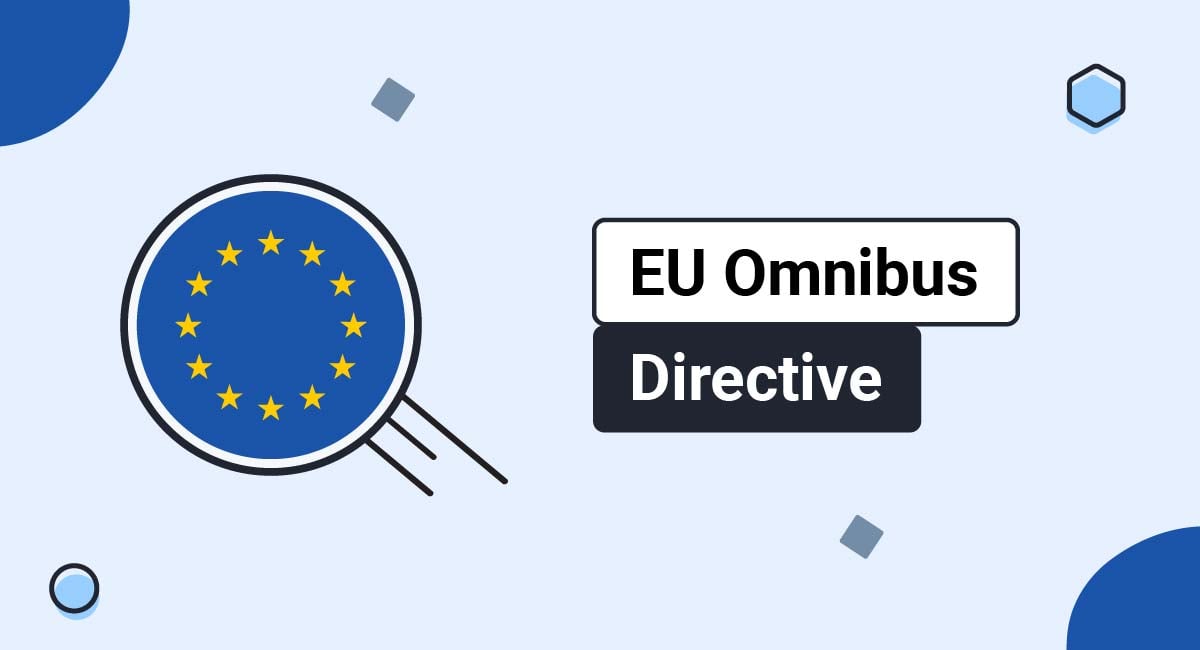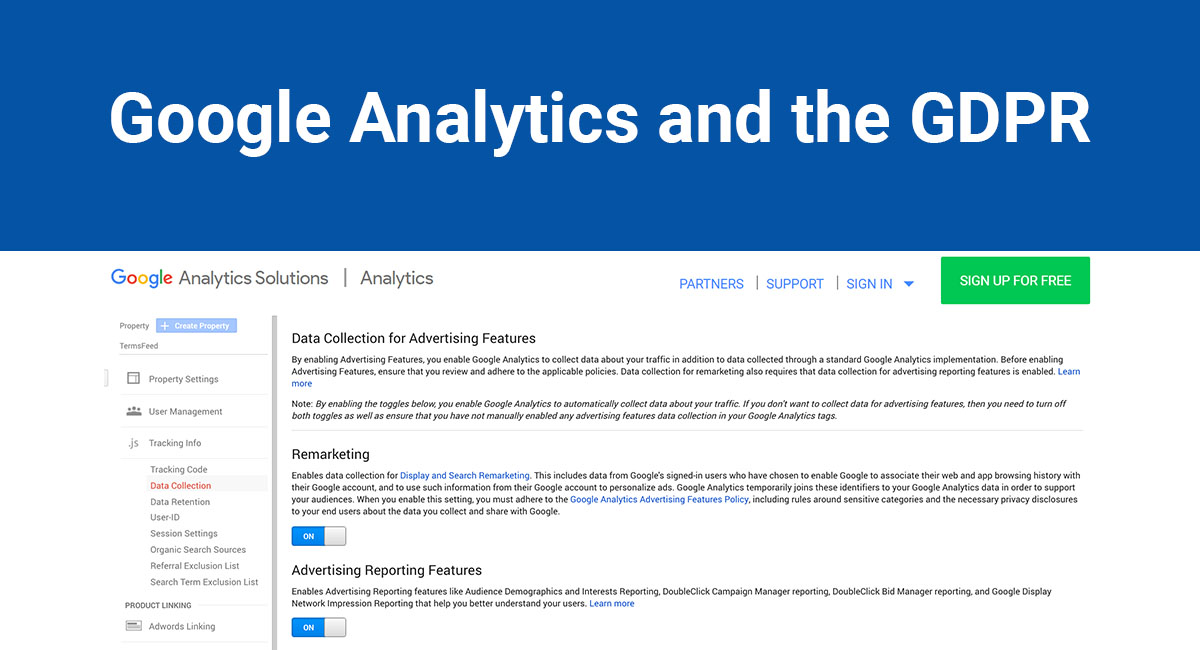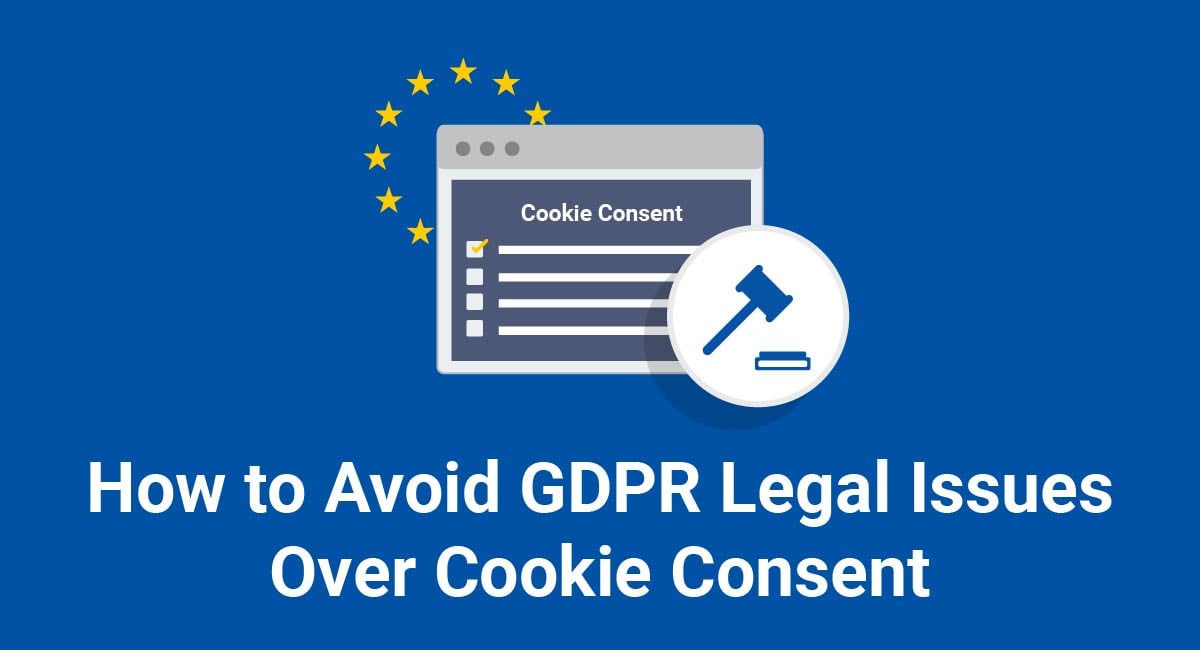The EU Omnibus Directive is a key piece of European legislation created to update EU consumer protection laws for new market developments.
Introduced under the EU New Deal for Consumers, the Omnibus Directive represents a significant step forward to promote ethical business practices and reinforce consumer rights across the EU marketplace.
This article will walk you through what this directive entails, which businesses are subject to its provisions, how you can comply, penalties for non-compliance, and more.
Let's dive in.
Our Privacy Policy Generator makes it easy to create a Privacy Policy for your business. Just follow these steps:
-
At Step 1, select the Website option or App option or both.

-
Answer some questions about your website or app.

-
Answer some questions about your business.

-
Enter the email address where you'd like the Privacy Policy delivered and click "Generate."

You'll be able to instantly access and download your new Privacy Policy.
- 1. What's the EU Omnibus Directive?
- 2. What's the Background of the EU Omnibus Directive?
- 3. Who Does the EU Omnibus Directive Apply to?
- 4. How Does the EU Omnibus Directive Affect Consumers?
- 5. What Does the EU Omnibus Directive Require?
- 5.1. New Consumer Rights for Digital Markets
- 5.2. "Free" Digital Goods, Content, and Services
- 5.3. Bans on Price Manipulations
- 5.4. Pricing Based on Automated Decisions
- 5.5. Online Marketplace Transparency
- 5.6. Prohibition on Fake Reviews
- 5.7. Communications Between Traders and Consumers
- 5.8. User-Generated Content
- 6. How Do You Comply With the EU Omnibus Directive?
- 6.1. Update Your Terms and Conditions Agreement
- 6.2. Verify Consumer Reviews
- 6.3. Evaluate Your Pricing Processes
- 6.4. Observe Rules for User-generated Content
- 7. How Will the EU Omnibus Directive Be Enforced?
- 8. What are the Penalties for Non-compliance with the EU Omnibus Directive?
- 9. Summary
What's the EU Omnibus Directive?
The EU Omnibus Directive is a legislative measure designed to modernize EU consumer law and strengthen enforcement measures - hence its official name: the "Enforcement and Modernisation Directive."
The Directive was passed on January 7, 2020. EU member states had until November 28, 2021, to adopt its provisions into their national law and until May 28, 2022, to fully implement it.
This directive amends four significant EU consumer legislation:
- The Price Indications Directive (98/6/EU)
- The Consumer Rights Directive (2011/83/EU)
- The Unfair Contract Terms Directive (93/13/EEC)
- The Unfair Commercial Practices Directive (2005/29/EC)
Through these amendments, the Omnibus Directive expands the scope of EU consumer protection to include digital goods, content, and services and not just physical ones.
The implication of this is that EU traders and (to a lesser extent) online marketplaces must comply with several new requirements to increase transparency and protect consumers in the digital environment.
What's the Background of the EU Omnibus Directive?
The EU Omnibus Directive has its roots in the New Deal for Consumers - an initiative adopted by the European Commission on April 11, 2018.
The goal was clear: Amend EU consumer laws to fit the changing global commerce landscape (particularly the rise of ecommerce) and strengthen enforcement.
With this goal came two key proposals:
- COM(2018) 185 strengthens and modernizes existing EU consumer legislation (eventually becoming the EU Omnibus Directive).
- COM(2018) 184 empowers EU consumers to seek joint redress for the same violations by a trader (also known as the Representative Actions proposal).
These proposals addressed two closely linked challenges. First, they tackled widespread unfair business practices affecting consumers across the EU and eroding trust in the Single Market.
Secondly, they addressed the results of the REFIT 'Fitness Check' - an assessment of EU consumer laws conducted by the Commission in 2017.
After several consultations, the Commission concluded that while the EU consumer protection framework was generally sound, it needed updates and more effective enforcement.
These events set the stage for the EU Omnibus Directive, a stride towards a more protective and consumer-centric marketplace.
Who Does the EU Omnibus Directive Apply to?
The EU Omnibus Directive primarily applies to "traders" who sell directly to EU consumers. And like most EU consumer legislation, it applies even if traders are physically located outside the EU.
In practice, the directive affects the following groups:
- Business-to-consumer (B2C) stores in the EU
- B2C ecommerce companies targeting EU consumers
- B2C companies providing EU consumers with "free services" (more on this below)
If your business falls under any of the above, you'll need to review and adjust your practices to comply with the EU Omnibus Directive.
It's also worth noting that online marketplaces that connect traders to EU consumers are required to observe new transparency requirements (also explained below).
How Does the EU Omnibus Directive Affect Consumers?
The EU Omnibus Directive helps consumers make better choices and allows them to exercise their rights when shopping online for digital content, services and other products.
It provides big boosts in transparency when it comes to things like ratings, reviews, price manipulation and content on websites and online marketplaces so that shoppers aren't misled or manipulated.
What Does the EU Omnibus Directive Require?
The EU Omnibus Directive gives consumers new rights and sets out several rules EU traders and online marketplaces must honor to protect consumers.
Let's review some of the more critical requirements you should consider.
New Consumer Rights for Digital Markets
As mentioned, the EU Omnibus Directive expands its scope of protection to include digital goods, content, and services. Typical examples include ebooks, music, software, etc.
To achieve this, the directive introduces new definitions (like 'online marketplace' and 'ranking') and updates existing ones (like 'product,' 'sales contract,' and 'digital service').
Now, when EU consumers buy digital products, they enjoy the same benefits and protections as traditional products, including:
- The right to receive relevant pre-contractual information
- The right to withdraw within 14 days of purchase (without any reason)
The only exceptions to these rights include when personal data is processed solely to deliver digital products or provided due to a legal requirement.
"Free" Digital Goods, Content, and Services
Another prominent update introduced under the EU Omnibus Directive is the new rules concerning 'free' digital products (i.e., offering digital goods, content, and services in exchange for personal data).
The directive recognizes that these digital products aren't actually free.
As a result, consumers who pay for digital products with their personal data (e.g., email addresses or phone numbers) now fall under the umbrella of EU consumer protection.
In other words, if you offer 'free' digital products, you must observe traditional consumer rights, including their right to withdraw within 14 days without cause.
In addition, you must clearly explain the main features of your digital product, how long the 'contract' lasts, and the terms for canceling it.
This update ensures that even with 'free' digital products, consumers have fair, transparent rights and understand what they're getting into.
Bans on Price Manipulations
Through the Price Indication Directive update, the EU Omnibus Directive makes pricing more transparent for EU customers, particularly when it comes to price reduction announcements.
In short, if you announce a price reduction on a product, you must calculate the discount based on the product's 'prior price' (i.e., the lowest price in the last 30 days or more before the discount was announced).
By calculating discounts using prior prices, traders are prevented from artificially inflating prices to give the illusion of a bargain.
For instance, if your clothing store offers a Black Friday deal on winter coats, you can't raise the coats' price in the lead-up to Black Friday and then offer a discount on the new, higher price.
Instead, you must calculate the Black Friday discount based on the coats' lowest price in the last 30 days or more.
Note that the prior price requirement only applies to physical products, not digital ones. Moreover, products that quickly expire or deteriorate (e.g., dairy and fresh fruits) may also be exempt.
To illustrate further, here's an example of a flash sale from Amazon that includes the prior price with a strikethrough and explains its purpose:
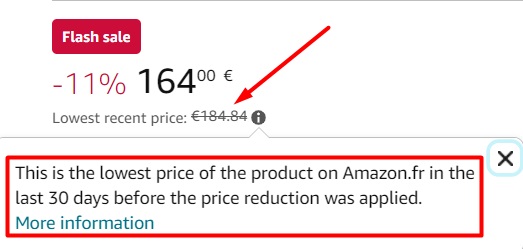
Here's another example of how this can look:

And one more from Zalando:
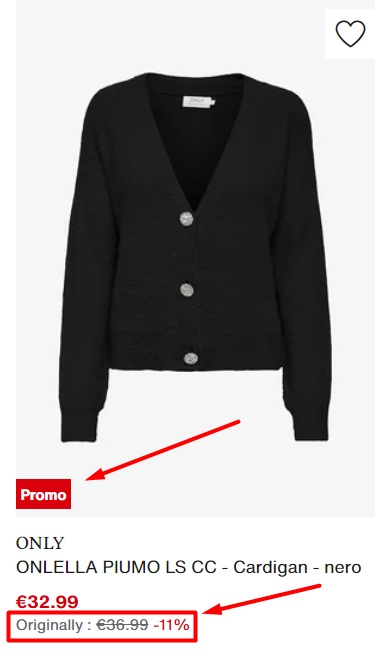
As long as the original price shown above is the lowest from the last 30 days, this promotion complies with the EU Omnibus Directive.
Pricing Based on Automated Decisions
Under the EU Omnibus Directive, traders must now clarify when the price of a particular good or service has been changed based on automated decision-making.
Some examples include the following:
- Automatic price changes based on individual consumer data (e.g., raising product or service prices for a particular user based on recent buying age or history)
- Automatic price changes reflecting high-demand seasons (e.g., raising hotel prices in the summer)
Online Marketplace Transparency
Under the EU Omnibus Directive, online marketplaces must give consumers clear information about their rights and whom they can contact for disputes or complaints.
In particular, online marketplaces must be upfront about the following:
- Whether a seller is a 'professional' trader or a private individual. After all, professional traders must follow the relevant consumer protection laws, whereas private individuals don't necessarily have to.
- What consumer protection features apply to any given purchase
- How the responsibility for compliance will be shared between the seller and the online marketplace
- The metrics used to rank search results (e.g., price, ratings, purchase history, or a combination of all) and how each of these metrics influence search rankings
By empowering consumers with this information, online marketplaces can help build trust between buyers and sellers, ultimately helping to create a safer and more productive environment for all.
Prohibition on Fake Reviews
One of the primary concerns of the EU Omnibus Directive is the widespread circulation of fake reviews across online marketplaces.
To combat this issue, traders must now clarify whether and how they've ensured consumer reviews are from real buyers who have used the products.
Addressing this issue, the Commissioner for Justice, Didier Reynders, said:
"Consumers very often rely on online reviews when shopping or booking online. I don't want consumers to be tricked. I want them to be able to interact in a trustworthy environment. I insist on one specific point: online businesses must provide consumers with clear and visible information on the reliability of such reviews ..."
The EU Omnibus Directive specifically bans the following review manipulation tactics:
- Putting up fake reviews
- Deleting negative reviews
- Not disclosing when search rankings are paid for
- Shifting endorsements from one product to another
- Falsely claiming that consumer reviews have been verified when they're not
By prohibiting dishonest reviews and other forms of false advertising, the directive aims to promote transparency and give customers confidence in the reviews they read.
Communications Between Traders and Consumers
In line with its goal of modernizing the consumer landscape, the EU Omnibus Directive includes provisions to allow more flexible interactions between traders and their customers.
Specifically, the directive now allows traders to use various online communication methods as long as:
- Customers can keep a written record of conversations
- The selected communication method is efficient and reliable
This freedom paves the way for more responsive and efficient business interactions via tools like chatbots, voice assistants, and other conversational AI.
User-Generated Content
The EU Omnibus Directive also addresses the ownership of user-generated content by giving more control to consumers.
In short, if a consumer asks for their content on your platform, you must provide it for free and within a "reasonable timeframe."
Note that this requirement only applies as long as the contract between you and the consumer is in effect.
How Do You Comply With the EU Omnibus Directive?
Complying with the EU Omnibus Directive may be challenging, particularly if you're a new company. Many of the rules may seem straightforward, but getting them right can be tricky.
To help you stay on track, here are some key areas to review in light of new requirements.
Update Your Terms and Conditions Agreement
With digital products now under EU protection, your Terms and Conditions must reflect new rights for digital products (including the 14-day withdrawal) and explain how consumers can exercise them. Remember that these rights also apply to 'free' digital products.
Here's how Nature includes the right of withdrawal for digital content in its Terms and Conditions, as well as how consumers can exercise this right:
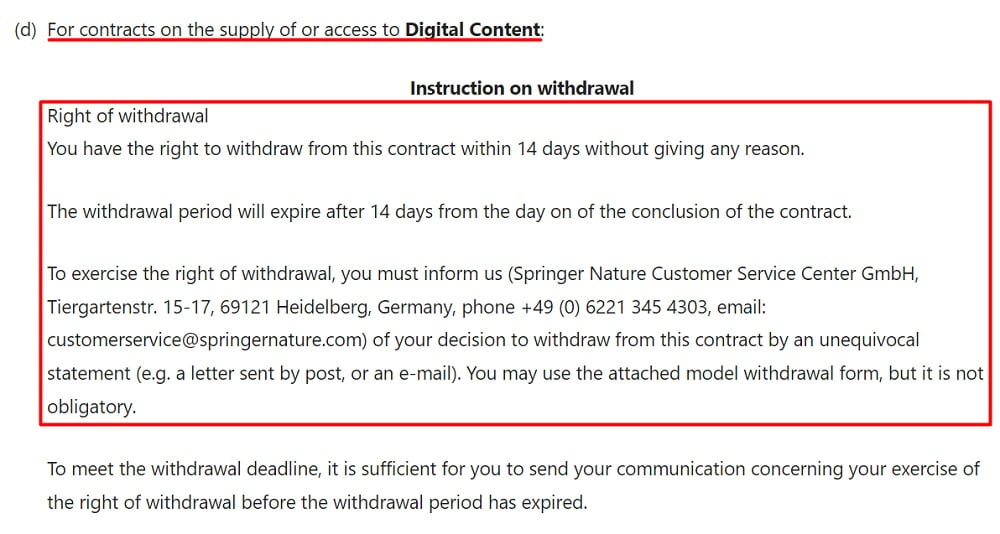
Updating your Terms and Conditions isn't a one-time task. You'll need to keep reviewing and adapting to remain compliant with relevant changes in this area of law.
On that note, it's a best practice to have a system for informing your customers about updates to your Terms and Conditions. Email notices are one of the most common ways to do this.
Here's how 4F informs its customers of new changes in light of the EU Omnibus Directive:
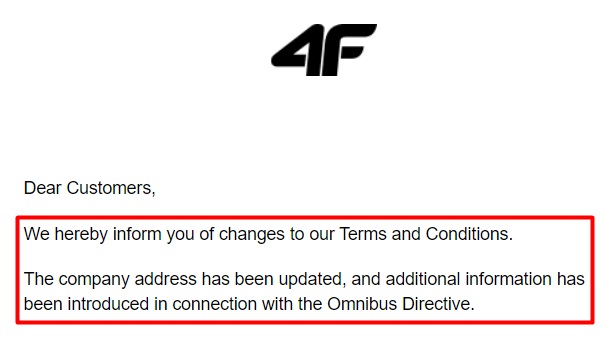
Your Terms and Conditions must also be easily accessible to consumers. Typical places to draw the most attention are your sign-up forms and website footer.
Here's how Shopify links its Terms and Conditions on its sign-up page:
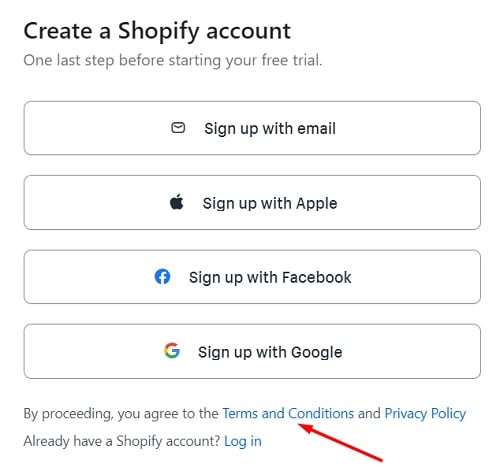
And here's how a General Terms and Conditions can be made accessible in a website footer:

Lastly, if you work with third parties that handle consumer personal data, you should also review your agreements with them. Specifically, you must ensure that if a consumer exercises their rights (like withdrawing from the agreement), it doesn't cause unintended issues with third parties.
Verify Consumer Reviews
As mentioned, the EU Omnibus Directive prohibits the use of fake reviews. This means you must assess and update your existing processes for verifying consumer reviews.
You may wish to use software solutions to automate and organize this process, as well as ensure each review is genuine.
When addressing this requirement, consider the following questions:
- How do you confirm the identity of reviewers?
- What software do you use to handle your reviews?
- How do you manage consumer reviews to ensure accuracy?
- Where do you host your reviews for accessibility and reliability?
- How do you share your review verification process with the public?
- How can influencers prove that they aren't being paid to review your products?
Here's how Amazon addresses its customer review processes:
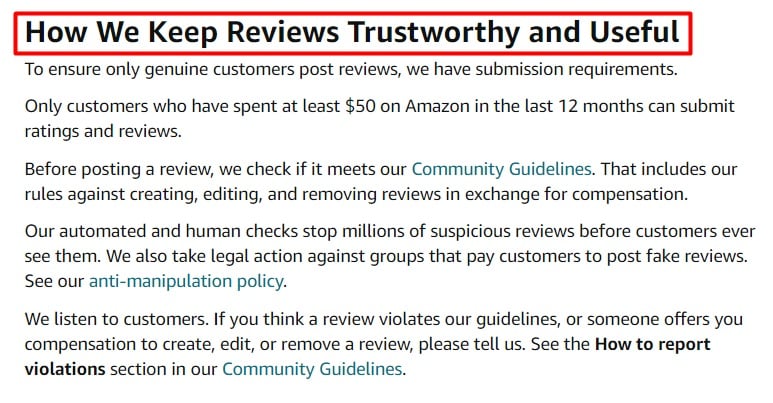
Evaluate Your Pricing Processes
Another key area to address is your pricing processes. As noted above, you must now calculate price discounts using prior prices, which are the lowest prices you sold products in the last 30 days or more before discounts.
Here's how a company could clarify price reduction practices:

In practice, you'll need to maintain a comprehensive pricing history to display prior prices accurately. Furthermore, if you use personalized or automated pricing processes, you must disclose this information in your listings.
Observe Rules for User-generated Content
Since consumers now have the right to access the content they create quickly and for free, you'll need to set up methods to retrieve user-generated content upon request.
By having an efficient system in place, you can ensure that facilitating this right doesn't become unmanageable for your business in the long term.
How Will the EU Omnibus Directive Be Enforced?
The EU Omnibus Directive establishes key principles and requirements around consumer protection, leaving enforcement to each EU member state.
In other words, how each member state chooses to implement the provisions of the EU Omnibus Directive into their national law is up to them.
What are the Penalties for Non-compliance with the EU Omnibus Directive?
Non-compliance with the EU Omnibus Directive attracts similar penalties as those established under the General Data Protection Regulation (GDPR).
For violations of the first three directives (i.e., the Unfair Commercial Practices Directive, Consumer Rights Directive, or Price Indications Directive), traders could be fined up to 4% of their annual turnover. A fine of 2 million euros could be levied if it's impossible to calculate the trader's turnover.
Member states have the discretion to decide fines based on the following factors:
- The type, gravity, and scale of violations
- Actions taken to reduce harm to consumers
- Previous offenses of the trader
- The financial effects of the violation (if available)
- Fines levied on the trader for the same offense in other EU countries
- Other relevant factors that better or worsen the case
For violations of the fourth directive (i.e., the Unfair Contract Terms Directive), traders may face fines from the EU member state in which they sell their services or products.
Specifically, such fines will be determined based on whether the contractual term violated is:
- Found unfair under national law
- Declared unfair by a final court decision
In other words, there's no set way to determine precisely how much a business will be fined if it breaks this directive. However, note that whatever amount you are penalized with may be significant, so it's in every trader's interest to err on the side of caution.
Summary
The EU Omnibus Directive was created to strengthen EU consumer rights by increasing transparency requirements and strengthening enforcement measures.
The directive primarily applies to traders who offer goods and services (physical or digital) to EU consumers, regardless of their location.
With the directive in force, consumers have more rights and protections in the EU marketplace and can seek remedies (including compensation) for unfair business practices.
On the other hand, traders must review and update their existing processes in light of new requirements.
To recap, you'll need to pay keen attention to the following requirements:
- Set up processes to verify consumer reviews for authenticity
- Update your existing Terms and Conditions agreement
- Evaluate and update your pricing processes
- Observe rules for user-generated content
By strengthening enforcement and standardizing new requirements across the EU, the Omnibus Directive ultimately helps protect and empower consumers in a rapidly evolving digital landscape.

Comprehensive compliance starts with a Privacy Policy.
Comply with the law with our agreements, policies, and consent banners. Everything is included.
